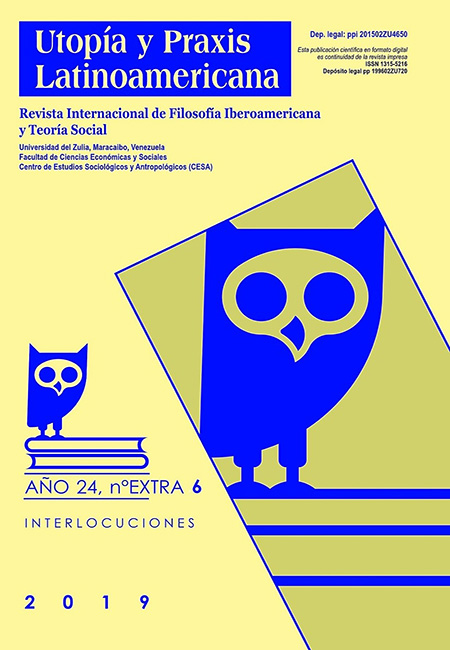Perspectives of mutual collaboration of BRICS countries in innovation sphere of enterprise activities
Resumen
ABSTRACT
The article analyzes the prerequisites and reasons for the unification of BRICS countries. It considers the level of innovative development of the participating countries in the light of international ratings, and conducts a SWOT analysis of the strengths and weaknesses of BRICS countries in innovation. Today there are many works devoted also to the economic development of BRICS countries. In this regard, an important task is the need to study possible "points of contact" in the development and use of the innovative potential of BRICS countries for cooperation in this area.
RESUMEN
El artículo analiza los requisitos previos y las razones para la unificación de los países BRICS. Considera el nivel de desarrollo innovador de los países participantes a la luz de las calificaciones internacionales, y realiza un análisis FODA de las fortalezas y debilidades de los países BRICS en innovación. Hoy en día hay muchos trabajos dedicados también al desarrollo económico de los países BRICS. En este sentido, una tarea importante es la necesidad de estudiar posibles "puntos de contacto" en el desarrollo y uso del potencial innovador de los países BRICS para la cooperación mutua en esta área.
Citas
ANNÍA G, María Eugenia., VILLALOBOS ANTÚNEZ, José Vicente., ROMERO PABÓN, Julio Cesar., RAMÍREZ MOLINA, Reynier Israel., & RAMOS MARTÍNEZ, Yanelis. (2018). “Conciencia ética en organizaciones universitarias: un estudio fenomenológico de la praxis como continua formación”. In Revista Inclusiones, 5(4), pp. 179-195.
ARMIJO, LE (2007). The BRICs countries (Brazil, Russia, India, and China) as analytical category: mirage or insight?. Asian perspective, pp. 7-42.
DAVYDENKO, V, ROMASHKINA, G, & LAZUTINA, D (2017). Structure and dynamics of the economy (Russia’s case). Evaluation of the economic forecast. Zeszyty Naukowe Polskiego Towarzystwa Ekonomicznego w Zielonej Górze, (7).
GRUEBER, M, & STUDT, T (2014). “global R&D funding forecast”. R&D Magazine, 16, pp. 1-35.
KALOGEROPOULOS, P, RUSSO, JA, SULLIVAN, P, KLOOGER, M, & GUNNINGHAM, S (2020). “Re-enfranchising Mathematically-alienated Students: Teacher and Tutor Perceptions of the Getting Ready in Numeracy (G.R.I.N.) Program”. International Electronic Journal of Mathematics Education, 15(1).
KONKIN, AA. Transregional Partnership of BRICS in Russian Studies.
LAUREANO, RMS, FERNANDES, AL, HASSAMO, S, & ALTURAS, B (2018). “Facebook Satisfaction and Its Impacts on Fundraising”: A Case Study at a Portuguese Non-Profit Organization. Journal of Information Systems Engineering & Management, 3(1), pp. 4-7.
MOHAMMADI, S, & YEKTA, P, (2018). “The Effect of Emotional Intelligence on Job Satisfaction among Stuff Nurses in Intensive Care Units”. UCT Journal of Social Sciences and Humanities Research, 6(2), pp. 1-7.
MOISEEVA, O., & MAZOL, S. (2013). “How to Make High-tech Industry Highly Developed?”. Effective Model of National R&D Investment Policy. In ICTERI, pp. 366-373.
NGQULUNGA, BO, & WALWYN, DA (2016). “Impact of changing business strategy on R&D portfolio”. Proceedings of the International Association for Management of Technology IAMOT, pp. 1713-1731.
NOORADI, M, BAGHERI NIA, H, & OULIAEY, A (2017). “Are the manager's bases of power related to job satisfaction?” UCT Journal of Management and Accounting Studies, 5(3), pp. 71-75.
RAMÍREZ MOLINA, Reynier Israel; LAY, Nelson; AVENDAÑO, Inirida & HERRERA, Belina. (2018). “Liderazgo resiliente como competencia potenciadora del talento humano”. In Opción. Revista de Ciencias Humanas y Sociales. Vol. 34, No. 86: 826-854. Maracaibo (Venezuela).
RINCÓN, Yanyn; SUKIER, Harold; CONTRERAS, Jairo & RAMÍREZ MOLINA, Reynier Israel. (2019). “Responsible Communication Strategies for Small and Medium-Sized Enterprises”. In Opción. Revista de Ciencias Humanas y Sociales. Vol. 35, No.89-2: 1208-1234. Universidad del Zulia. Maracaibo (Venezuela).
PAKDEL, M, & ASHRAFI, M (2019). “Relationship between Working Capital Management and the Performance of Firm in Different Business Cycles”. Dutch Journal of Finance and Management, 3(1).
RADULESCU, IG, PANAIT, M, & VOICA, C (2014). BRICS countries challenge to the world economy new trends. Procedia Economics and Finance, 8, pp. 605-613.
SADOVNICHEV, VA, YAKOVETS, VY, & AKAEV, AA (2014). Prospects and strategic priorities. Prospects and strategic priorities for the ascent of BRICS.
SIDOROVA, E (2018). “The Innovation Development of the BRICS Countries: Preconditions and Prospects for Cooperation”. International Organisations Research Journal, 131, pp. 34-50.
TOLORAYA, G (2015). “Why Does Russia Need BRICS?”. Russia in Global Affairs, 13(1), pp. 128-139.









